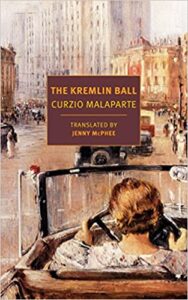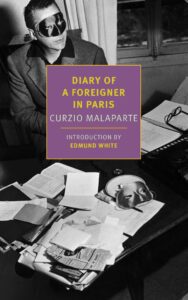
"The Kremlin Ball" (Translated by Jenny McPhee) & "Diary of a Foreigner in Paris" (Translated by Stephen Twilley)
In 1998, I wrote a piece for New York Press on Curzio Malaparte (1898-1957). Northwestern University Press had reissued the Italian author’s two most acclaimed works: Kaputt (1944) and The Skin (1949). Very little of Malaparte’s other work was in print in English translation.
I called Malaparte “the losers’ lost historian” in that article, and it was this particular element of these two works that most piqued my interest. He was among those who marched on Rome with Mussolini in 1922, and yet he proved to be a fascist with imperfect alignment. Malaparte’s ferociously ambiguous politics pushed him in and out of Il Duce’s prisons in the 1930s, yet they also rehabilitated him sufficiently to grant him access to Axis military and diplomatic operations as a journalist during the war. And when the winds shifted again, he trimmed his sails, finding work with occupying U.S. forces in Italy after Mussolini’s collapse.
I called Malaparte “the losers’ lost historian” in that article, and it was this particular element of these two works that most piqued my interest.
Kaputt and The Skin offer a view of the war from the other side. Kaputt takes its readers to Nazi-occupied Poland and the puppet Ustashe state in Croatia, and includes descriptions of horrifying massacres committed by German troops. Yet the book offers a stinging portrait of the slippery vulgarities of diplomacy as it was conducted in places such as Sweden and Finland. The public civilities that were plastered on the face of repulsive cruelties. And The Skin? Few novels of the twentieth century are as curdled and poisonous as this depiction of a morally bankrupt Italy swarming with ignorant American occupiers.
Kaputt and The Skin unveil an enemy beyond the newsreels. Yet they also paint the experience of war with a vividness and pith that seems almost too good to be true. In many cases, it is. And the line between fact and fiction is an essential element in any analysis of these works.
This is especially true of Kaputt. The Skin is often distressingly “on the nose,” and in many cases, its fictions are quite obvious. Yet Kaputt is something altogether different. Its pages shimmer with what Malaparte described as “gruesome gaiety.” That it is not reportage hardly seems to matter at the bitter end of the book, where the flies have triumphed in bombed-out Naples, or in the resonant words placed by the author in the mouth of Susannah, a Moldavan prostitute:
“Do you know who will win the war? Perhaps you imagine that the Germans or the British or the Russians will win the war? The war will be won by us, by Lublia, Zoe, Marica; by me and all those who are like us. It will be won by whores.”
There has been a boom in interest in Malaparte in English translation since 1998. The most significant efforts have come through the New York Review of Books, which not only republished Kaputt and The Skin, but have also released two other works: The Kremlin Ball in 2018 and (most recently) Diary of a Foreigner in Paris.
Both books were written after the Second World War. The Kremlin Ball (translated by Jenny McPhee) is a collection of Malaparte’s unfinished reflections on the time he spent in Russia in the late 1920s. (The NYRB edition has the subtitle: “Material for a Novel.”) The Diary consists of a series of contemporaneous jottings—shaped, perhaps, with an eye toward publication—from a 1947 and 1948 residence in post-war Paris and Switzerland.
The Kremlin Ball is by far the more interesting of the two books, both as a literary work and as a deeper account of Moscow in a period often chronicled by western fellow travelers who journeyed to the Soviet Union to see the future in action.
Kaputt and The Skin unveil an enemy beyond the newsreels. Yet they also paint the experience of war with a vividness and pith that seems almost too good to be true. In many cases, it is. And the line between fact and fiction is an essential element in any analysis of these works.
Malaparte’s account of Soviet life in the late 1920s on the cusp of Stalin’s prolonged wave of purges is a gimlet-eyed take on a society that the author believes has merely swapped one aristocracy for another. Malaparte sniffs out the stink of death already in the air among the romantic intrigues and tittle-tattle in the ranks of “proletarian” courtiers.
These often-trivial misadventures so proximate to an inexorable tide of mass killing are made all the more ironic by Malaparte’s belief that communism possessed a unique inability to come to grips with death. Near the end of the book, a lengthy disquisition on the meaning of death under communism and capitalism includes the author’s observation that:
“In communist countries, everyone is ashamed of death, ashamed to admit that at the end of Karl Marx Boulevard or Lenin Boulevard or Stalin Boulevard, just as at the end of Roosevelt Boulevard or Wilson Boulevard or Marshall Boulevard, there is death, a smooth cement wall without doors of windows that is death. They are ashamed to have to recognize that communism can’t change man’s ultimate destiny–death; communism can do nothing against the supreme wretchedness, the supreme nakedness, the supreme loneliness, the supreme degradation of death.”
Malaparte has a nose for death in all his works. He also has a way of putting himself in the center of events. In The Kremlin Ball, he even makes himself a central character in an account of Vladimir Mayakovsky’s suicide. Yet the book also relates a number of encounters and conversations with Mikhail Bulgakov, author of The Master and Margarita that seem eerily prescient:
“In which of your plays is Christ hiding?” I asked Bulgakov. “Which character is called Christ?”
“Christ has no name in my play,” Bulgakov responded with a tremor of fear in his voice. “Christ is by now a useless character in Russia. It’s useless to be Christians in Russia. We don’t need Christ anymore.”
“You’re afraid of saying his name,” I said. “You are afraid of Christ.”
“Yes, I am afraid of Christ,” Bulgakov responded in a whisper, staring at me with fear all over his face.”
Perhaps Malaparte knew (though it is stretching it) that Bulgakov was writing The Master and Margarita in 1929. But he could not have known that the Russian author burned the manuscript in 1930 and started over in 1931. He also could not have known, when he set The Kremlin Ball aside in the late 1940s, that Bulgakov had finished his masterwork, which would be published at last in 1966–almost a decade after Malaparte’s death in 1957.
In this context, Malaparte’s hectoring of Bulgakov about Christ is not merely strangely comical. It is positively Bulgakovian in its strangeness, potential danger, and inappropriate earnestness. It is a spooky quality that emerges often in Malaparte’s work: a wrong man finds himself in the right place at the right time. 
Turn to Diary of a Foreigner in Paris, however, and you discover the journal of the wrong man in the wrong place at the wrong time. The book is Malaparte’s account of his return to Paris after the war. He has become famous for Kaputt, and has just released The Skin. Yet what should be a vital and triumphant moment is instead transformed into an interlude of desolation, rejection, and something that veers very close to madness.
The Kremlin Ball is by far the more interesting of the two books, both as a literary work and as a deeper account of Moscow in a period often chronicled by western fellow travelers who journeyed to the Soviet Union to see the future in action.
Throughout the diary, Malaparte describes his deep and nostalgic affection for Paris. As Stephen Twilley observes in his “Translator’s Note” to Diary, he had visited the city at the age of twenty–and maintained deep connections there throughout the 1930s. (Indeed, Malaparte’s first taste of international literary success came with the publication–in French–of his 1931 study of seizures of power by force: Coup D’etat: The Technique of Revolution).
Twilley also sketches out the complexities of Italy’s political situation in that moment. Malaparte’s past as a fascist sympathizer proved more problematic than it did elsewhere, despite the number of coats he had turned. These precarious politics led the author back to a Paris that Nazi occupation had changed utterly.
Post-war Paris proved no less complicated than Italy. Merely less dangerous. The gap between Malaparte’s nostalgia for a vanished Paris of his youth and the reality that greets him there in 1947 is palpable. It is a portrait of the author as a spent, deluded, and self-pitying wreck, unspooling endless ridiculous reflections on Cartesianism, or offering anecdotes from his past–about Spanish prisoners in Finland, or chiding Mussolini to his face about his ugly ties–that must have seemed a consolation in his circumstances.
Malaparte’s penchant for namedropping, too, seems to misfire. He flies back to Paris on a plane with Roberto Rossellini. He attends a party with Orson Welles. (Sadly, none of this encounter is provided.) Jean Cocteau seems bored with him. Albert Camus is venomously dismissive.
Much of Diary wallows in self-justifications of his own fickle politics of collaboration. On June 10, 1948, he writes, “I am more and more convinced that I prefer real collaborationists to fake resistants.” Yet the maw of actual madness opens as Malaparte describes his habit of barking aloud with dogs at night–a practice that annoys his neighbors, vexes local authorities, and seems rooted in the misanthropy that is central to his literary project. He records that Swiss authorities, in particular, took a dim view of it:
“I shall return to France, where foreigners can bark as much as they like.”
“I do not doubt it, monsieur. France is a country of loose morals.”
“To bark at night is not to have loose morals.”
“It begins with barking, monsieur, and it finished with biting. The Swiss don’t like being bitten.”
Diary of a Foreigner in Paris adds useful context to our view of Malaparte. But it also leaves us desirous to have a Swiss policeman to accompany us at all times as we read it.
What we have available to us of Malaparte in English–and especially Kaputt–possesses the power of an auto wreck. Our heads to swivel to it as if by reflex. But what we lack still is a context for this arresting work.
How do we interpret the desolation, depression, and delusion of the Diary, for instance, knowing that less than two years later, Malaparte wrote and directed a successful film–The Forbidden Christ–that was nominated for a Palme d’Or at Cannes in 1951? Or what do we make of the zigs and zags of Malaparte’s career in fascism? Not only works such as Coup D’Etat, but also Vivo Caporetto! (1921)–which has not been translated, but interprets the disastrous Italian collapse on the Isonzo front in 1917 as a “revolt” by that nation’s troops.
One’s tastes, perhaps, will dictate whether the latest releases of Malaparte’s work in English leave you wanting more. Yet what we do crave is more of a framework to interpret his dazzling, repulsive, and compulsive attraction for readers of the present moment.
